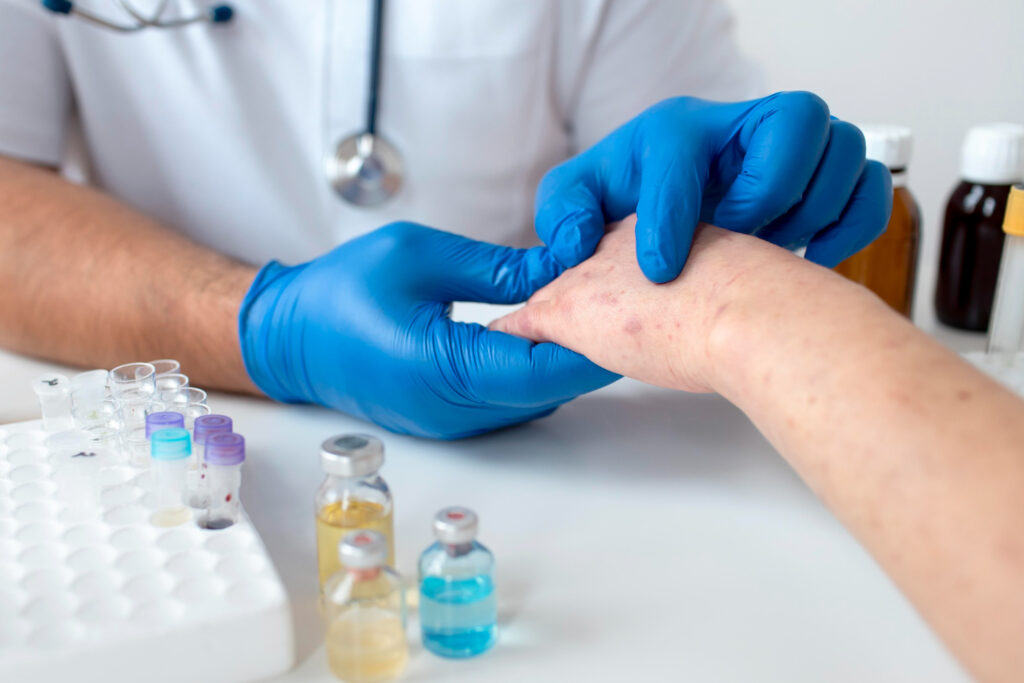
In this article
Warts are small skin growths caused by viral infections, particularly common in childhood. About 65% of wart infections resolve on their own without medical treatment. It’s essential to consult with a doctor about treatment options to weigh the risks and benefits, as some treatments can cause scarring.
About Warts
Warts are skin infections caused by the human papillomavirus (HPV). There are over 100 types of HPV, each responsible for different kinds of warts, such as common warts, plantar warts, flat warts, and genital warts. Warts are especially prevalent in children, with up to one in five children affected, particularly those aged 12 to 16. Many wart infections resolve naturally without medical intervention.
Symptoms of Warts
The characteristics of warts vary by type but generally include:
- Small, raised bumps on the skin
- Sizes ranging from one to 10 millimeters
- Rough or smooth surfaces
- Occurrence singly or in clusters
- Possible itching
- Commonly affected areas: face, feet, knees, and hands
Types of Warts
HPV causes several types of warts, including:
- Common Warts (Verruca Vulgaris): Hard, raised lumps with rough surfaces, typically found on knees and hands.
- Flat Warts (Verruca Plana): Smooth, flattened lumps, often appearing on the face, lower legs, and hands.
- Filiform Warts: Thin, long threads usually located on the face, particularly near the eyelids and lips.
- Mosaic Warts: Clusters of tightly grouped warts, often on the hands and soles of the feet.
- Plantar Warts: Small, hard bumps with tiny black dots, typically found on the soles of the feet.
- Genital Warts: Grey or off-white lumps with a grainy ‘cauliflower’ appearance, commonly on the penis, vulva, and anus. Some types can increase the risk of cervical cancer in women.
Risk Factors for Warts
While anyone can develop warts, certain factors increase the risk, including:
- Skin injuries
- Skin infections that break the surface
- Frequently wet hands
- Heavy sweating of hands or feet (hyperhidrosis)
- Swimming in public pools
- Nail biting
- Direct contact with another person’s warts
- Scratching or shaving warts, spreading the infection to other body areas
Diagnosis of Warts
Most warts are easily recognizable. For unusual warts, consult a doctor for a proper diagnosis.
Treatment for Warts
There are various treatments for warts. Discuss with your doctor the risks and benefits, as some treatments can cause scarring. Warts can be stubborn and may require multiple treatment types.
Treatment Options Include:
- Do Nothing: About 65% of warts clear up within two years without treatment. However, new warts can develop more frequently in infected children. This approach isn’t recommended for those with multiple warts or long-standing warts.
- Topical Chemicals: Salicylic acid or lactic acid treatments can be applied, with some requiring a doctor’s supervision. It may take over three months to be effective.
- Immune System Stimulators: Imiquimod is used for genital warts, stimulating the immune system to fight the infection. DPCP (diphenylcyclopropenone) works similarly, but is available only in specialist clinics.
- Cryotherapy: Freezing warts with liquid nitrogen, potentially requiring up to four months of treatment.
- Curettage and Electrocautery: Surgical removal under local anesthesia, with potential scarring.
- Laser Therapy: Burning off warts with a laser, which may cause scarring.
- Gardasil®9 Vaccination: Protects against HPV strains linked to genital warts and cervical cancer. Available for free to individuals aged 12 to 25, but it does not treat existing warts.
Genital Warts
If you suspect you have genital warts, seek medical advice. The ‘wait and see’ approach is not recommended. Women with genital warts should also undergo a Cervical Screening Test to check for cervical cancer
A Quick Review
Warts are small skin growths caused by the human papillomavirus (HPV), affecting various body parts such as hands, feet, and genitals. Common in children, they often resolve on their own within two years without medical treatment. However, various treatments are available, including topical agents, cryotherapy, and immune stimulators. Consultation with a doctor is recommended to determine the best treatment approach and minimize scarring risks
FAQS
What causes warts?
Warts are caused by the human papillomavirus (HPV). There are more than 100 types of HPV, each responsible for different kinds of warts.
Are warts contagious?
Yes, warts are contagious and can spread through direct contact with a wart or through contact with surfaces that have been in contact with the virus, such as floors and towels.











